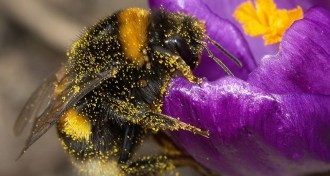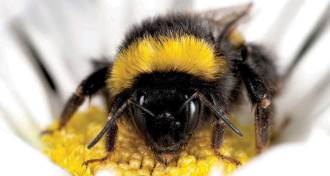Search Results for: Bees
Skip to resultsCan’t find what you’re looking for? Visit our FAQ page.
1,568 results for: Bees
-
 Animals
AnimalsMethylation turns a wannabe bumblebee into a queen
Epigenetic changes to bumblebee DNA turns a worker into a reproductive pseudo-queen, suggesting that genomic imprinting could be responsible for the bumblebee social system.
-
 Life
LifeBig study raises worries about bees trading diseases
Pathogens may jump from commercial colonies to the wild.
By Susan Milius -

19129
This article is surely wrong in stating that the honey badger shuns meat. It aggressively attacks snakes and small mammals, as well as invades bees’ nests for honey. Derek WallentinsenSan Pedro, Calif. I was looking at the picture of the animal’s skull and wondering how large it is. There’s no scale for reference, so I […]
By Science News -

Africanized bees rescue loner trees
Africanized bees pollinate some of the big Brazilian forest trees now stranded in the middle of cleared land away from their native pollinators.
By Susan Milius -

Beer-flavoring compounds guide insects
The class of compounds that give beer its bitterness does two more sober jobs in Hypericum flowers.
By Susan Milius -
 Plants
PlantsPetite pollinators: Tree raises its own crop of couriers
A common tropical tree creates farms in its buds, where it raises its own work force of tiny pollinators.
By Susan Milius -
 Animals
AnimalsHoney-Scented Elephants: Young males’ faces drip sweet signals
An Asian bull elephant just reaching maturity secretes a liquid from glands on its face that smells like honey.
By Susan Milius -
 Plants
PlantsFringy flowers are hard to dunk
The fringe on the edges of the floating blooms of water snowflake flowers helps protect the important parts from getting drenched in dunkings.
By Susan Milius -
 Earth
EarthHoney may pose hidden toxic risk
Many honeys may contain potentially toxic traces of potent liver-damaging compounds produced naturally by a broad range of flowering plants.
By Janet Raloff -
 Animals
AnimalsMole-rats: Kissing but not quite cousins
Damaraland mole-rats live underground in rodent versions of bee hives, but a genetic analysis of these colonies finds that kinship isn't very beelike.
By Susan Milius -
 Plants
PlantsMirror Image: Flowers with opposite styles have a fling
Scientists have discovered a gene that controls whether flowers lean to the left or the right.
-
 Agriculture
AgricultureKiller bees boost coffee yields
Even self-pollinating coffee plants benefit substantially from visits by insect pollinators.
By Janet Raloff